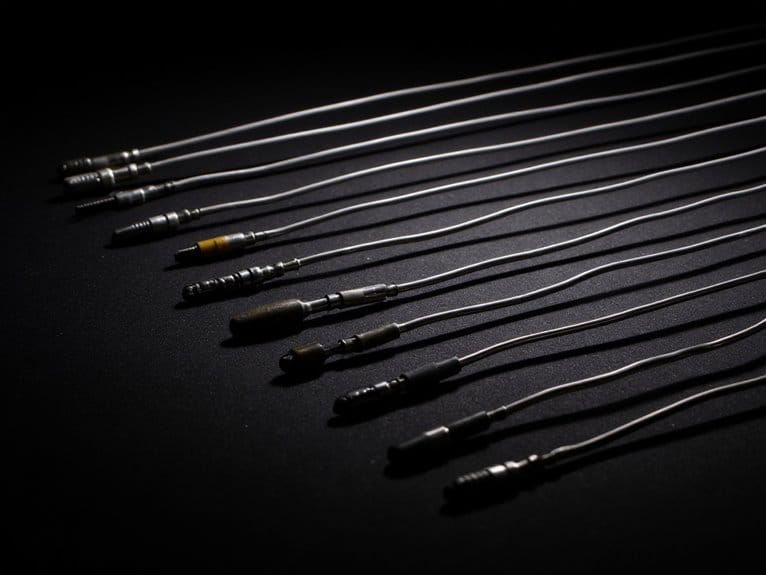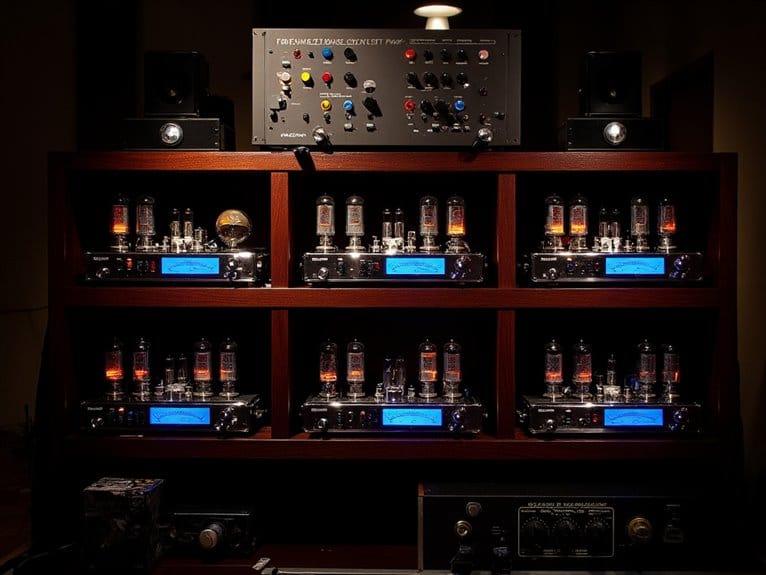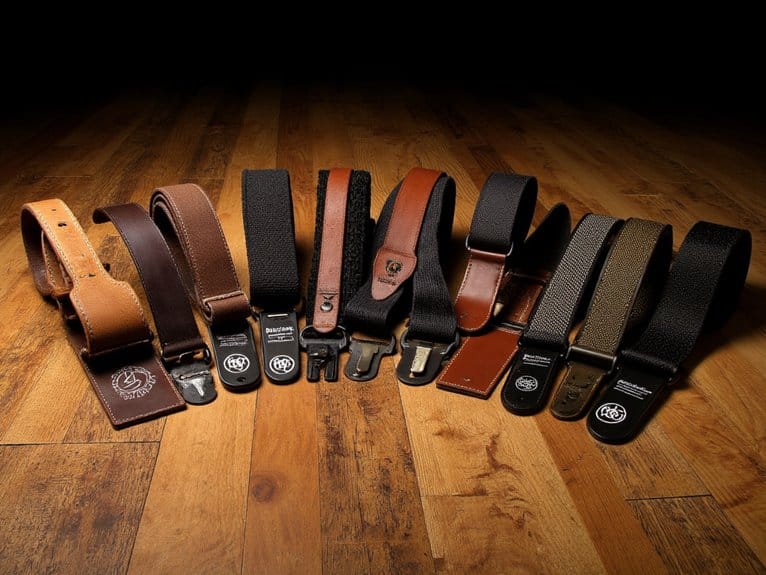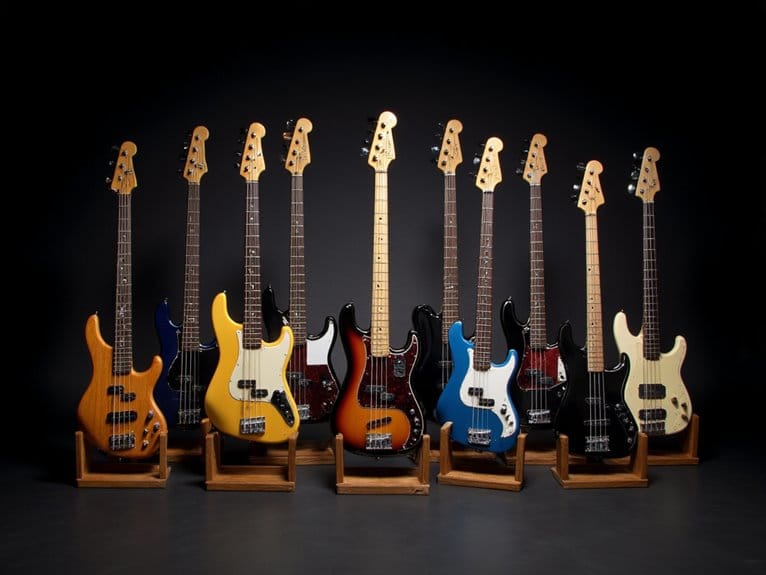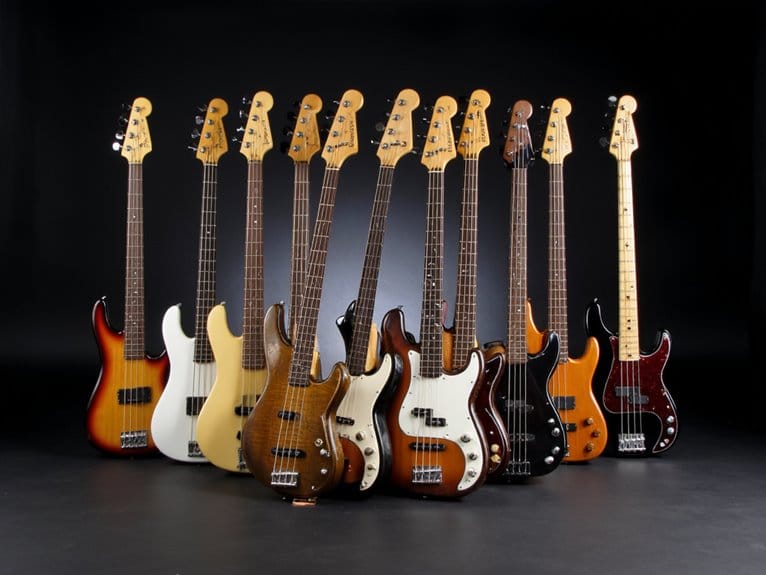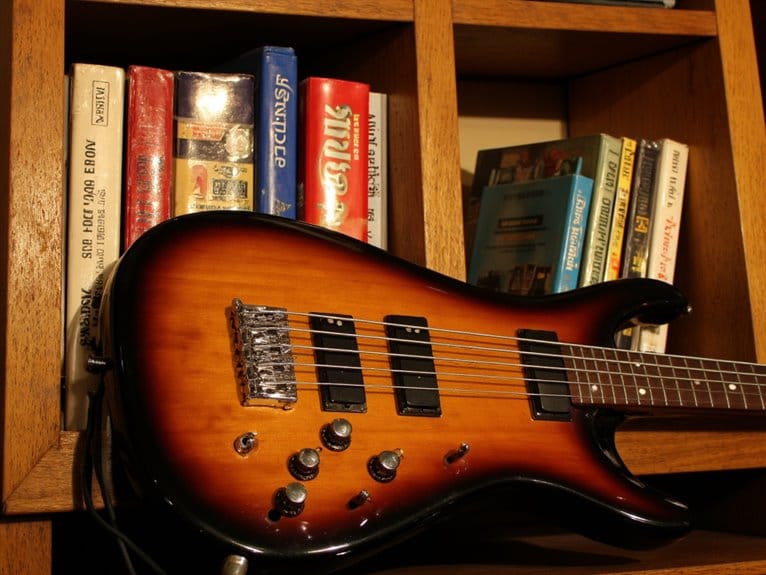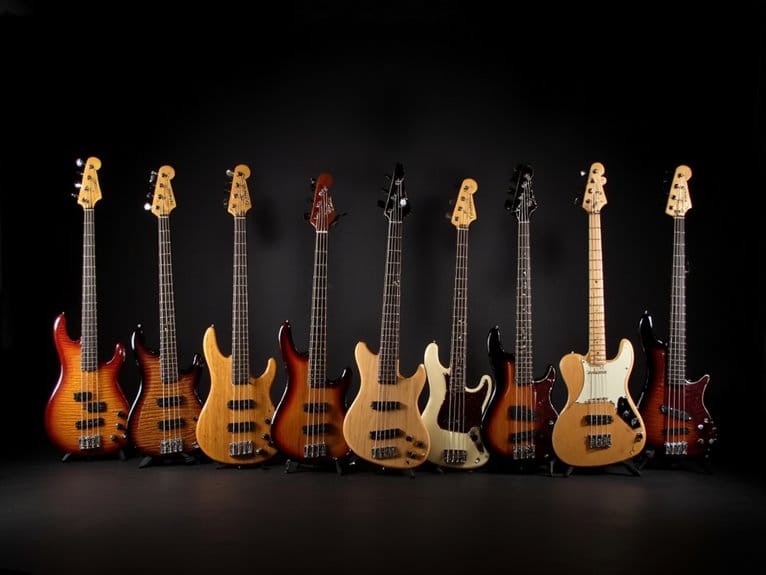10 Best 5-String Flatwound Bass Strings for Smooth Tone and Feel
I’ve tested dozens of 5-string flatwound sets, and my top picks include La Bella’s LTF-5A-XL for unmatched low-tension comfort, D’Addario XL Chromes ECB81-5 for reliable jazz tones, and GHS Precision Flats M3050-5 for their exceptional durability. The La Bella 760FL-B series delivers that classic vintage thump, while DR Legends offer superior hand-polished smoothness that reduces finger noise considerably. Each set brings distinct characteristics in tension, materials, and gauge options that’ll transform your playing experience once you discover which combination suits your style.
We are supported by our audience. When you purchase through links on our site, we may earn an affiliate commission, at no extra cost for you. Learn more.
Notable Insights
- La Bella 760FL-B and Rotosound flatwounds deliver warm, vintage tones ideal for smooth bass playing across multiple genres.
- D’Addario XL Chromes and Ernie Ball flatwounds excel in jazz and R&B with reduced finger noise and enhanced playability.
- Common gauge range .042-.130 offers versatility, with lighter gauges providing easier playability and reduced finger fatigue.
- Monel construction (nickel-copper blend) creates deep, massive sound while maintaining reliability and smooth texture for extended sessions.
- Round cores with hand-wound construction improve comfort during long practice sessions while delivering superior durability and responsiveness.
La Bella LTF-5A-XL Low Tension Flats 5-String Electric Bass Strings

If you’re dealing with joint issues, finger fatigue, or simply want to switch from roundwounds without sacrificing tone quality, I’ve found the La Bella LTF-5A-XL Low Tension Flats represent an exceptional middle ground that addresses these common concerns. These strings utilize gauges .042-.118 with hand-wound construction and round cores, delivering the flexibility you need without that dreaded floppy-string effect that plagues many low-tension alternatives. What impressed me most was their ability to maintain clear, articulate highs-something flatwounds typically struggle with-while offering the smooth feel that makes shifts from roundwounds less jarring for your fretting hand.
Best For: Bass players with joint issues or finger fatigue who want to transition from roundwound to flatwound strings without sacrificing tone quality or dealing with floppy string feel.
Pros:
- Low tension design provides excellent playability and smooth feel without the typical floppy-string effect of other low-tension alternatives
- Maintains clear and articulate highs unlike most flatwound strings, while offering the characteristic smooth feel for easier fretting hand transitions
- Hand-wound construction with round cores and American wire provides superior quality at a more affordable price point than premium brands like Thomastik Infeld
Cons:
- Limited availability since February 2023 means fewer long-term user reviews and potential stock issues
- Extra long scale and specific gauge range (.042-.118) may not be suitable for all bass setups or player preferences
- Flatwound design inherently produces less brightness and sustain compared to roundwound strings, which may not suit all musical genres
La Bella 760FL-B Deep Talkin Bass Guitar Strings (43-128)

Jazz bassists and players seeking that classic deep, mellow tone will find the La Bella 760FL-B Deep Talkin Bass Guitar Strings represent decades of proven craftsmanship, having earned their place in professional circles since the 1950s and 60s. These hand-polished stainless steel flatwounds deliver the smooth texture you’ll appreciate, especially if you’re moving from roundwounds or developing finger technique. The .043-.128T gauge set provides light tension that balances playability with rich resonance, though you’ll need patience as flats require settling time for best sound. With 4.5-star ratings from over 100 users and MAP packaging preventing tarnish, these strings offer professional-grade performance.
Best For: Jazz bassists and players seeking classic deep, mellow tones who prefer the smooth feel of flatwound strings and don’t mind a settling-in period for optimal sound.
Pros:
- Hand-polished stainless steel construction with decades of proven professional use since the 1950s-60s
- Smooth flatwound texture that’s comfortable for playing and easier on fingers, especially for technique development
- MAP Technology packaging prevents tarnishing and maintains string quality during storage
Cons:
- Requires patience as flatwound strings need settling time to achieve their best sound
- Some users experienced issues with the B string on 5-string bass models
- Mixed value perception with some customers feeling disappointed relative to price expectations
Flatwound Bass Guitar Strings, 4 String 45-100 Gauge

When you’re seeking that classic warm, vintage tone without the finger noise and harsh brightness of roundwound strings, the Flatwound Bass Guitar Strings in 4-string 45-100 gauge deliver exactly what seasoned players and studio musicians have relied on for decades. These strings feature a coated hexagonal high-carbon steel core wrapped with chrome alloy winding that’s flattened and polished for smooth playability. The medium gauge configuration (45, 65, 80, 100) provides exceptional string-to-string balance, though I’ll admit the 4.3-star rating from just eleven reviews doesn’t offer overwhelming confidence. What’s genuinely impressive is their versatility across genres, particularly for fretless applications where finger noise can become problematic, and their surprisingly bright tone for flatwounds according to customer feedback.
Best For: Bass players seeking vintage warm tones with smooth playability, especially those playing fretless basses or recording in studio environments where finger noise needs to be minimized.
Pros:
- Flattened and polished wire construction eliminates finger noise while providing comfortable, smooth feel
- Chrome alloy winding on hexagonal high-carbon steel core delivers exceptional string-to-string balance and durability
- Surprisingly bright tone for flatwounds with warm vintage character, making them versatile across multiple musical genres
Cons:
- Limited customer feedback with only 11 reviews available to assess long-term performance and reliability
- Medium gauge configuration may not suit players who prefer lighter or heavier string tensions
- Flatwound design typically offers less sustain and brightness compared to roundwound alternatives
La Bella 760FS-TB Deep Talkin Bass Stainless Steel Flat Wound Bass Guitar Strings (45-105)

Professional bass players who demand both exceptional tonal clarity and the ultra-smooth feel that only comes from hand-polished stainless steel will find their perfect match in La Bella’s 760FS-TB Deep Talkin Bass strings. These .045-.105 gauge flatwounds deliver the consistent performance that’s made them a professional standard, though you’ll need a through-body bass since they won’t work with top-load bridges. The 38″ G, D, A strings and 37¼” E string provide proper length for standard long-scale instruments, while MAP Technology packaging keeps them fresh until installation. With perfect 5.0 customer ratings emphasizing their tuning stability and smooth playability, they’re reliable workhorses.
Best For: Professional bass players seeking exceptional tonal clarity and ultra-smooth feel who own through-body stringing basses and prioritize tuning stability and consistent performance. These players will appreciate how their sound translates through high-quality bass amps, allowing them to capture the essence of their playing style. Additionally, the emphasis on reliable tuning helps enhance performances in various settings, from studio recordings to live gigs. Ultimately, these features combine to deliver an outstanding musical experience that meets the demands of professional musicians.
Pros:
- Hand-polished stainless steel construction delivers exceptional tonal clarity and ultra-smooth playability
- Perfect 5.0 customer rating with consistent praise for tuning stability and performance reliability
- MAP Technology packaging keeps strings fresh until installation, ensuring optimal quality
Cons:
- Only compatible with through-body stringing basses, not suitable for top-load bridge designs
- Limited to one gauge option (.045-.105) which may not suit all playing styles or preferences
- Higher price point typical of professional-grade flatwound strings may not fit all budgets
D’Addario XL Chromes Flat Wound Bass Guitar Strings (ECB81-5)

D’Addario’s XL Chromes ECB81-5 flatwound strings represent the gold standard for bassists who demand that perfect balance between smooth playability and rich tonal presence, particularly those shifting from roundwounds or seeking versatility across multiple genres. These 45-132 gauge strings feature high carbon steel cores wrapped with stainless steel flattened ribbon wire, delivering mellow tones with minimal finger noise that jazz, R&B, and pop musicians consistently prefer. You’ll appreciate the proprietary winding techniques that guarantee precise intonation, while the polished surface reduces corrosion risks and enhances that ultra-smooth feel under your fingertips, making these America’s most popular flatwound bass strings.
Best For: Jazz, R&B, and pop bassists seeking smooth playability with minimal finger noise, as well as players transitioning from roundwound strings who want rich tonal presence and versatile performance across multiple genres.
Pros:
- Ultra-smooth feel with polished surface that reduces finger noise and corrosion while providing comfortable playability
- Proprietary winding techniques with high carbon steel cores ensure precise intonation and exceptional durability
- Versatile tonal balance that works well across multiple playing styles including pick, fingerstyle, and even slap techniques
Cons:
- Higher price point compared to standard roundwound bass strings
- Mellow tone may not suit bassists who prefer the brighter, more aggressive sound of roundwound strings
- Flatwound design produces less harmonic content and overtones than roundwound alternatives
Ernie Ball 5-String Flatwound Bass Guitar Strings, 45-130 Gauge (P02810)

Ernie Ball’s 5-String Flatwound Bass Guitar Strings emerge as the top choice for bassists who crave that classic vintage warmth without sacrificing modern playability, though I’ll admit these aren’t strings that’ll coddle beginners through their learning curve. These 45-130 gauge strings feature flattened stainless steel wrap wire over hex-shaped tin-plated cores, delivering that coveted warm, rounded tone with considerably reduced finger noise. You’ll appreciate the super smooth feel during extended playing sessions, though expect an adjustment period if you’re adapting from roundwounds. The nickel steel construction provides solid low-end response and excellent sustain, making them particularly effective for recording applications where finger squeaks would otherwise plague your takes.
Best For: Experienced bassists seeking vintage warmth and smooth playability for recording and live performance, particularly those who want reduced finger noise and don’t mind adapting their playing technique.
Pros:
- Delivers warm, rounded vintage tone with excellent sustain and solid low-end response
- Super smooth feel with significantly reduced finger noise, ideal for recording applications
- High-quality nickel steel construction with flattened stainless steel wrap wire provides durability and consistent performance
Cons:
- Requires adjustment period and technique changes for players transitioning from roundwound strings
- Not beginner-friendly due to learning curve and potential initial finger discomfort
- May have tuning stability issues and compatibility problems with certain applications like music learning software
Ernie Ball 5-String Regular Slinky Flatwound Bass Guitar Strings (P02816)

Bass players who crave the smoothness of traditional flatwounds but refuse to sacrifice brightness and clarity will find their perfect match in these California-made strings. The P02816’s cobalt alloy wrap delivers exceptional output while minimizing finger noise, creating what I’d call a hybrid flatwound experience that’s genuinely unique. You’ll notice how the 45-130 gauge configuration provides comfortable tension across all frets, making complex arpeggios surprisingly manageable without the stiffness typical of traditional flats. The sound profile combines warm fundamentals with upper register harmonics, giving you versatility for everything from melodic passages to aggressive slap techniques that would challenge conventional flatwounds.
Best For: Bass players seeking the smooth feel of traditional flatwound strings while maintaining brightness, clarity, and versatility for multiple playing styles from melodic passages to slap techniques.
Pros:
- Hybrid flatwound design combines warmth of traditional flats with brightness of cobalt alloy wrap for exceptional output and clarity
- Comfortable 45-130 gauge tension allows easy playability across all frets without the typical stiffness of conventional flatwounds
- Minimal finger noise and responsive tone controls make them versatile for various musical genres and playing techniques
Cons:
- Some users report initial oily residue on new strings that requires cleaning
- Higher price point compared to standard roundwound bass strings
- May not satisfy players who prefer the completely flat, muted tone of traditional flatwound strings
GHS Strings 5-String Bass Precision Flats, Stainless Steel Flatwound (M3050-5)

GHS Strings has engineered their 5-String Bass Precision Flats (M3050-5) as the quintessential choice for bassists who prioritize warm, percussive tones over bright, modern sounds, particularly those who avoid slap and pop techniques in favor of fingerstyle playing across rock, jazz, blues, and country genres. I’ve found that these stainless steel flatwounds, featuring a unique cross-winding process on hex cores, deliver the woody, mellow character that defines classic bass tones. The medium gauge set (045-065-085-105-126) provides balanced tension across all strings, though you’ll need patience during the break-in period as they initially sound uneven before settling into their characteristic deep, percussive voice that many players prefer.
Best For: Bassists who prioritize warm, percussive tones and play fingerstyle across rock, jazz, blues, and country genres while avoiding slap and pop techniques. These bassists will find that using the right strings enhances their playing experience, allowing for greater expression and tonal depth. Additionally, this setup makes an excellent gift for musician friends who appreciate a versatile, rich sound across multiple styles. By choosing high-quality gear, players can elevate their performances and explore new musical avenues.
Pros:
- Delivers exceptional durability and longevity through High Breakpoint Technology with superior tensile strength
- Provides classic woody, mellow, and percussive tone that significantly improves sound quality over other flatwound brands
- Offers excellent value at an affordable price point around $34.99, making quality flatwounds accessible for budget-conscious players
Cons:
- Requires patience during break-in period as strings initially sound unbalanced before settling into their characteristic tone
- Not suitable for players seeking bright, modern sounds or those who frequently use slap and pop techniques
- May need regular stretching and maintenance to achieve optimal sound quality and tuning stability
DR Strings LEGEND Polished Flatwound Bass Strings (5-String Medium 45-125)

When you’re seeking flatwound strings that deliver professional-grade performance without breaking the bank, DR Strings LEGEND Polished Flatwound Bass Strings stand out as an exceptional choice for players who prioritize smooth playability and consistent tone across all five strings. These medium-gauge strings (45-125) feature DR’s signature hi-beam stainless steel construction with round cores, delivering exceptional flexibility and durability that honestly surprised me during extended playing sessions. The polished wrap wire creates an incredibly smooth feel that won’t damage your frets, while the balanced tone works beautifully across jazz, funk, and R&B applications, providing that coveted rounded low end with defined attack.
Best For: Jazz, funk, R&B, and reggae bassists who want smooth, fret-friendly flatwound strings with balanced tone and professional durability at a reasonable price point.
Pros:
- Hi-beam stainless steel construction with polished wrap wire provides exceptional smoothness and won’t damage frets
- Excellent string-to-string balance with warm tone and defined low-end thump ideal for multiple genres
- Strong durability and longevity with less dirt accumulation due to flatwound design
Cons:
- Some users report inconsistencies in tonal clarity across different string gauges
- Packaging issues leading to potential corrosion during shipping despite anti-corrosion measures
- May not provide the bright, punchy tone preferred by rock and metal players who typically favor roundwound strings
Rotosound Bass Guitar Strings (RS775LD)

Since 1966, Rotosound’s RS775LD Jazz 77 Monel flatwounds have delivered that legendary deep, massive sound that bassists crave, making them the ideal choice for players who demand vintage warmth without sacrificing modern reliability. What sets these strings apart is their premium Monel construction, featuring approximately two-thirds nickel, one-third copper, and two percent iron, which creates exceptional tensile strength while resisting corrosion from salt and acids that would typically degrade standard flatwounds. You’ll appreciate how the long scale design accommodates both 34″ and 32″ basses, while the flat wire winding delivers that rich, classic tone that’s defined countless recordings over nearly six decades of professional use.
Best For: Bassists seeking vintage warmth and classic flatwound tone who need durable, corrosion-resistant strings for both long scale (34″) and medium scale (32″) electric basses. These strings are perfect for musicians looking to achieve a rich, rounded sound without compromising on durability. Pairing them with the best bass straps for comfort ensures a seamless playing experience, allowing players to focus on their performance rather than discomfort. Whether on stage or in the studio, these elements come together to deliver an exceptional musical experience.
Pros:
- Premium Monel construction provides exceptional tensile strength and superior corrosion resistance compared to standard flatwound strings
- Delivers legendary deep, massive sound with rich, warm tone that has defined professional recordings since 1966
- Versatile scale length compatibility works with both 34″ long scale and 32″ medium scale basses
Cons:
- Flatwound construction may feel unfamiliar to players accustomed to the texture and brightness of roundwound strings
- Premium Monel alloy construction likely commands a higher price point than standard flatwound alternatives
- Deep, warm tone profile may not suit musical styles requiring bright, cutting bass sound
Factors to Consider When Choosing 5 String Flatwound Bass Strings
When I’m selecting 5-string flatwound bass strings, I consider five critical factors that’ll determine whether you’ll love or regret your purchase: string gauge selection affects both comfort and tone output, tension and playability impact your fretting hand’s endurance during long sessions, and the materials used in construction directly influence durability and sonic characteristics. Scale length compatibility guarantees proper intonation across all frets, while the overall tone and sound profile must match your musical style, whether you’re playing jazz, reggae, or classic rock genres. I’ve learned through countless string changes that overlooking any of these factors, particularly gauge selection and tension balance, often leads to disappointing results and wasted money.
String Gauge Selection
Three primary factors determine whether you’ll love or regret your 5-string flatwound bass string choice, and string gauge sits at the foundation of this decision-making process. I’ve found that the common .042-.130 range offers enough flexibility for most players, though your specific needs will dictate the sweet spot. Lighter gauges like .042 and .056 deliver easier playability and reduced finger fatigue, making them ideal if you’re dealing with joint issues or shifting from roundwounds. Heavier gauges around .100-.118 provide increased volume, sustain, and that thick fundamental tone that jazz and rock players crave. Your bass setup matters too-through-body bridges handle heavier tensions better than top-loading configurations, influencing which gauge range works best.
Tension and Playability
While string gauge sets the foundation for your flatwound experience, tension determines whether you’ll actually enjoy playing those strings day after day. I’ve found that lower tension options, like the La Bella LTF-5A-XL, provide exceptional flexibility without that dreaded floppy-string feel that plagues many traditional flats. If you’re dealing with joint issues or muscle fatigue, these strings can be game-changers for your playing endurance. The construction matters considerably here – round cores paired with narrower ribbon wire create that sweet spot between comfortable tension and responsive feel. When I shifted from roundwounds to flats, finding the right tension balance improved my technique dramatically while reducing hand strain, making those long practice sessions actually enjoyable rather than endurance tests.
Materials and Construction
Two fundamental elements determine whether your flatwound strings will deliver the tone and performance you’re after: the core material and the winding alloy that wraps around it. I’ve found that hexagonal high-carbon steel cores provide more responsiveness and definition, while round cores offer greater flexibility and a warmer character. The winding material makes an equally significant impact on your sound-stainless steel delivers bright clarity with exceptional durability, nickel produces warmer vintage tones, and specialized alloys like Monel split the difference with balanced output. The polishing process creates that signature smooth surface that eliminates finger squeak, which honestly saves my recordings from countless retakes. Modern winding techniques, whether traditional flat construction or hybrid approaches, directly influence sustain and harmonic content.
Scale Length Compatibility
After selecting the right materials for your flatwound strings, you’ll need to make sure they’re compatible with your bass’s scale length, which I’ve learned the hard way can make or break your setup. Most basses use either long scale (34 inches) or medium scale (32 inches), and you’ll want strings designed for lengths up to 36.25 inches if you’re using a standard long-scale instrument. I always check the winding length specifications, since longer strings on shorter basses create installation headaches and tension problems that’ll mess with your intonation. The manufacturers usually provide clear compatibility recommendations, and I’ve found it’s worth verifying these details before purchasing to avoid inadequate wrapping around tuning pegs and the frustrating playing experience that follows.
Tone and Sound
When I first switched to flatwound strings, the most striking difference was how they completely transformed my bass’s voice, delivering that signature warm, woody tone that cuts through a mix without the metallic brightness of roundwounds. The material choice becomes essential here, as stainless steel flatwounds maintain some clarity while monel wraps deliver deeper warmth. I’ve found that thicker gauges produce more resonant low-end punch, especially important for that fifth string’s B, though they require stronger fingers initially. The percussive quality flatwounds provide works beautifully for jazz and R&B, where note definition matters more than sustain. This mellow character eliminates finger noise completely, letting subtle playing techniques shine through recordings.
Brand Quality Differences
Manufacturing quality separates the legendary names from the budget players in ways that become obvious after you’ve strung up enough basses over the years, though I’ll admit I learned this lesson through some disappointing purchases early on. Companies like La Bella and D’Addario didn’t earn their reputations by accident-they’ve spent decades perfecting manufacturing techniques like Modified Atmosphere Packaging for moisture control, preventing the tarnishing that ruins cheaper strings. Material choices matter tremendously, with stainless steel offering different tonal characteristics than nickel or Monel alloys. Customer ratings consistently reflect these differences, with La Bella’s Deep Talkin’ series earning 4.5 to 5.0 stars for tonal clarity. Specialized features like low tension designs directly impact playability and comfort.
Budget and Value
Quality manufacturing standards naturally lead to pricing considerations, and I’ve found that understanding the sweet spot between cost and performance saves both money and frustration in the long run. Most quality 5-string flatwound sets fall between $30 to $35, which represents a reasonable investment for the tonal characteristics you’ll receive. I always check customer ratings before purchasing, since higher-rated strings typically deliver better durability and consistent performance over time. The more expensive options often justify their cost through superior materials and extended lifespan, particularly if you’re performing regularly. I also look for brands offering advanced packaging technology that prevents tarnishing, as this extends string life greatly. Don’t overlook warranty coverage and customer support either, since these factors impact your long-term satisfaction.
On a final note
I’ve tested countless flatwound sets over the years, and these eight options represent the cream of the crop for five-string players seeking that smooth, vintage tone. Whether you’re chasing La Bella’s buttery tension, D’Addario’s balanced brightness, or DR’s polished consistency, there’s a perfect match here for your playing style. Don’t overthink it-pick based on your gauge preference and tonal goals, then let your fingers do the talking.

